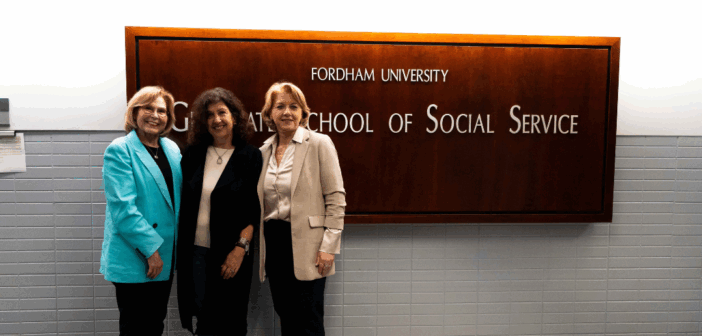Migration issues are filling our newsfeeds, stretching social workers thin, and even controlling the U.S. Supreme Court’s docket since the new Presidential administration took power in January. The country’s constitutional values are being tested, and threats of deportation seem to linger in the air like a heavy cloud.
However, America is not the only country dealing with immigration services pressures, as GSS Master of Social Work students learned from guest lecturer Lydia Sapouna, a professor at the School of Applied Social Studies within the University of Cork in Ireland.
Sapouna’s presentation, “De-Medicalizing Human Distress – The Experience of Asylum Seekers in Ireland,” stressed the importance of context when considering mental health diagnoses in immigrant populations.
“By looking only at [the]diagnosis, we don’t get the context – you must apply the diagnosis to context,” she said. “Someone who is genuinely afraid of being deported, is this an anxiety disorder, or is it just fear?”
A Long History of Mental Health Care Shortcomings
Sapouna, originally from Greece, said the inspiration behind her interest in improving mental health services stemmed from learning about the Leros Psychiatric Hospital in her home country. Dubbed “Europe’s Guilty Secret” by the British Observer in 1989, the Hospital held patients under horrible living conditions, overseen by personnel with no training.
The horrific results of the Leros Hospital convinced Sapouna to view mental health “as a political model, not just a question of clinical care, but human rights.”

Sapouna speaks to M.S.W. students at Fordham’s Lincoln Center campus.
Sapouna then discussed the history of Ireland’s Magdalen Laundries, institutions whose thrust was to “reform fallen women”—AKA those who engaged in pre-marital intercourse—by incarcerating them and forcing them to perform unpaid laundry and needlework. The women housed in the Magdalen Laundries, which existed until the 1980s, suffered such physical and mental abuse that they would leave permanently “institutionalized,” unable to continue a balanced life in everyday society.
The historical discussion grounded students for a conversation about how to understand institutionalization and how to challenge the dominant thinking around mental illness, which typically focuses on pathology — the technology of the diagnosis and treatment of symptoms.
Sapouna separated her challenge of traditional thinking and practice around mental illness into five categories:
- Recognition of the social dimensions of mental illness
- Questioning the medical/pharmacological model, due to a lack of biological evidence
- Recognition of iatrogenic harm (harm caused by excessive medication)
- Recognition of service-users/survivors/”mad people” as experts by experience
- Emergence of the recovery philosophy (One should be able to live a good life, even while managing symptoms)
The parallels between Sapouna’s research and social work’s person-in-environment guiding principles were prevalent — not to mention the Jesuit philosophy of cura personalis, or “care for the whole person.”
Inequity’s Compounding Impact
Ireland’s asylum seekers are subject to numerous systemic inequities, Sapouna said, that tend to accelerate and magnify the mental health issues from which they may already be suffering.
The country’s “Direct Provision” reception centers, where asylum seekers stay while awaiting their status approval, are one example. Sapouna described how these centers isolate and exclude those inside from society by setting mealtimes and curfews, not allowing children to host friends, and creating barriers to employment.
What’s worse is that the situation for these people outside the Direct Provision centers isn’t much better. Sometimes, they request to continue staying in the center even after receiving asylum status.
“It’s like Stockholm Syndrome,” Sapouna said, even comparing the centers to 21st-century Magdalen Laundries.
The end result for asylum seekers is much worse mental health outcomes than Irish citizens. Sapouna noted that asylum seekers are five times more likely than Irish citizens to be diagnosed with mental illnesses, including suicidal tendencies.
A Shift to Understanding
The lecture finished with students reading powerful quotes from asylum seekers in Ireland describing their experiences and state of mental health. Why? To understand. To respect their experience. To treat them like human beings, not diagnoses.
“We need to move from describing symptoms to understanding experiences,” Sapouna said.
This type of broader narrative methodology—bearing witness to what the person is feeling and experiencing—is the way to help them achieve a better quality of life, Sapouna said.
It all comes down to context: When we focus on symptoms, we limit the opportunities to contextualize the experience of distress associated with forced migration, Sapouna said. Too narrow a focus on trauma can also limit our ability to understand.
“To achieve heightened understanding and effective interventions, we must empathetically listen and engage with asylum seekers’ meanings, narratives of distress, and the socio-cultural and sociopolitical context they inhabit,” she said.



